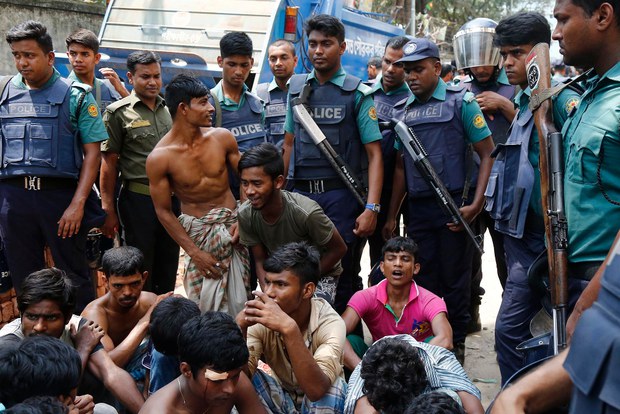Amnesty International Calls on Bangladesh to End Extrajudicial Killings
2019.11.04
Dhaka
 Bangladesh police officers stand over suspected drug dealers who were arrested during a counter-narcotics operation in Dhaka, May 28, 2018.
Bangladesh police officers stand over suspected drug dealers who were arrested during a counter-narcotics operation in Dhaka, May 28, 2018.
Hundreds of Bangladeshis died in apparent extrajudicial killings and enforced disappearances when Dhaka launched a narcotics crackdown last year, Amnesty International said in a new report Monday, but a government official denied that authorities had summarily executed anyone.
In its report the London-based watchdog examined findings by local human rights advocacy groups that 466 people were killed in 2018 alone after Prime Minister Sheikh Hasina’s government declared a war on illegal drugs in May of that year.
“The Bangladeshi authorities must put an end to these killings immediately. The ‘anti-drugs’ operations have spread terror in some of the country’s poorest neighborhoods, where people fear the slightest suspicion of being involved in drug abuse may lead to their loved ones being subjected to another alleged extrajudicial execution,” Dinushika Dissanayake, Amnesty’s deputy director for South Asia, said in a statement.
On average, “the ‘war on drugs’ has led to the death of at least one person per day. Wherever there has been involvement of the Rapid Action Battalion it appears they have acted outside of the law, the victims were not arrested, let alone put on trial,” Dissanayake said, referring to the country’s elite security force, which is also known by the acronym RAB.
“Some were forcibly disappeared from their homes and their relatives only saw them next as bullet-riddled corpses in the morgue,” he added.
Amnesty also called for an independent and impartial probe into allegations that the victims were killed in staged “crossfire” shootings and that law enforcement officers had fabricated evidence against drug suspects.
Amnesty’s 25-page report, “Killed in ‘Crossfire,’” documented seven of the cases of alleged extrajudicial killings through on-site visits and interviews with 40 people. The sources included so-called “witnesses” who were allegedly coerced by law enforcement into giving authorities statements, Amnesty said.
Shah Ali Farhad, a special assistant to Prime Minister Hasina, rejected the allegations about extrajudicial killings in Amnesty’s report, describing them as inaccurate.
“It is not proper to call such casualties extrajudicial killings. It means we are killing them without judgment, but the things are different,” Farhad told BenarNews.
He is a senior analyst with the research wing of Bangladesh’s ruling Awami League party.
“They are killed in crossfire during an exchange of gunshots between two groups,” Farhad said, adding, “No country in the world was able to conduct anti-narcotic operations very peacefully. Because it is a very violent type of trade. Drug traffickers also have a lot of weapons.”
The government investigates each case of a fatality resulting from crossfire or shootouts between police and suspects, he said.
“In no way can it be said that the government is arresting them and killing them by staging a drama to make it lawful,” Farhad told BenarNews.
“If law enforcement agencies open fire in any case and if there is any casualty, that case must be investigated as per our law. We do it,” he said, adding that families of people killed in crossfire had “the right to go to court seek remedy.”
Shipa Hafiza, the executive director of Ain O Salish Kendra, a Bangladeshi NGO that reported that 466 people died in extrajudicial killings in 2018, said the number of such deaths had “dropped a bit this year in view of the protests by human rights activists.”
“But these have yet to be stopped completely,” Hafiza told BenarNews. “We are very much concerned about it, because not a single extrajudicial killing was investigated properly.”







